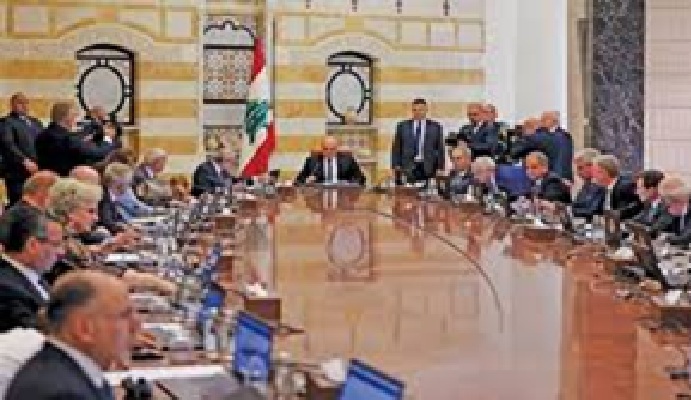
Afrasianet - Abdullah Nasser Al-Din - In light of the decision taken by the Lebanese Cabinet in two stages to approve all the provisions of the US paper, we are revealing to the public the gaps that may lead to undeclared normalization!
In the wake of the US paper titled "Proposal to Extend and Confirm the Declaration of Cessation of Hostilities between Lebanon and Israel in October 2024 to Promote a Lasting and Comprehensive Solution", fundamental questions are being raised about whether this paper, which has been dubbed in Lebanon the "Barak Paper", paves the way for the normalization of relations between Lebanon and Israel, and whether it provides real guarantees to Lebanon to prevent repeated Israeli aggressions.
In light of the decision taken by the Lebanese Council of Ministers in two stages in two government sessions to approve all the contents of the paper, we reveal to the public opinion the gaps that may lead to undeclared normalization, and what Lebanese proposals the Lebanese government should have answered the paper through to preserve Lebanon's security and prevent a slide towards a conditional peace.
First: A Reading of the Memorandum of Understanding – Between Sovereignty and Normalization
1. Disarming Hezbollah:
The third clause provides for the "gradual phase of ending the presence of all unofficial armed actors, including Hezbollah." This clause, although it falls under the umbrella of strengthening state sovereignty, ignores the Lebanese geopolitical reality, where Hezbollah is seen as part of the deterrence system against Israeli aggression. Disarming it without clear security guarantees is a strategic concession.
2. Conditional Israeli withdrawal:
The fifth and seventh items talk about Israel's withdrawal from the "five points" and from Lebanese territory, but without specifying a clear timetable or implementation mechanism. According to official statements, Israel is also holding these points for security reasons, which opens the door to procrastination or reoccupation.
3. Focus on demarcation:
The eighth and ninth clauses propose the demarcation of the borders with Israel and Syria, which is a necessary technical step, but it is often used as a gateway to normalizing relations, which is considered a tacit recognition of the Israeli occupation entity, and thus changing the strategic concepts of the Lebanese state.
4. International Economic Conference:
The tenth item calls for an economic conference with the participation of the United States, France, Saudi Arabia, and Qatar, to implement President Trump's "vision" for Lebanon's renaissance. This item links Lebanon's economic stability to a U.S. political project (including the Abraham Accords project), which raises concerns about the imposition of political conditions in exchange for financial support, including normalization.
Second: Does the memorandum provide security guarantees for Lebanon?
The short answer is: "No."
- There is no clear clause that obliges Israel not to launch future attacks on Lebanon.
- According to the Minister of Defense, Israel considers that the collapse of the agreement will bring down the "immunity of the Lebanese state," which means that the Israeli response will not distinguish between Hezbollah and the state.
- The continuation of Israeli airstrikes despite the ceasefire proves the absence of actual guarantees.
- Lebanon, through President Nabih Berri, demanded written guarantees for Israel's withdrawal and an end to the violations, but Washington did not provide them.
Third: Gaps that pave the way for normalization.
1. Loose diplomatic language: The use of terms such as "comprehensive solution" and "permanent demarcation" without specifying the nature of the future relationship.
2- Absence of explicit rejection of normalization:
The memorandum does not include any clause prohibiting the establishment of diplomatic or economic relations with Israel.
3- International pressure in exchange for financial support:
Linking economic support to Hezbollah's disarmament leaves Lebanon with two options: normalization or collapse.
4- Replacing the military track with the diplomatic track:
Israel has begun sending diplomatic representatives instead of military representatives to the talks, reflecting a shift toward gradual normalization.
Fourth: What is the alternative text that suits Lebanon?
To prevent normalization and protect national security, any negotiating text must include the following items:
1. Written and internationally binding security guarantees, including a complete cessation of all Israeli air, land and sea violations. An international mechanism to monitor the ceasefire under the supervision of the United Nations.
2- An explicit rejection of normalization: including a clause stating that the agreement is not a prelude to any diplomatic or economic relationship with Israel.
3- Linking disarmament to full withdrawal: The issue of weapons will not be discussed until after Israel withdraws from all the occupied Lebanese territories and the airstrikes stop.
4- Inclusion of a clause on resistance as a legitimate right: and explicit recognition of Lebanon's right to defend itself, including popular resistance, as long as Israel occupies its territory or violates its sovereignty.
5- Ruling out any conditional external vision: including refusing to link economic support to any external political project, such as Trump's "vision", which has a normalizing nature.
In conclusion, it can be emphasized that the proposed memorandum, although presented as a peace document, carries within it the seeds of undeclared normalization and lacks the security guarantees that Lebanon needs. What is required today is not only the cessation of hostilities, but the formulation of an agreement that preserves sovereignty, rejects normalization, and guarantees Lebanon's security without external conditions.

